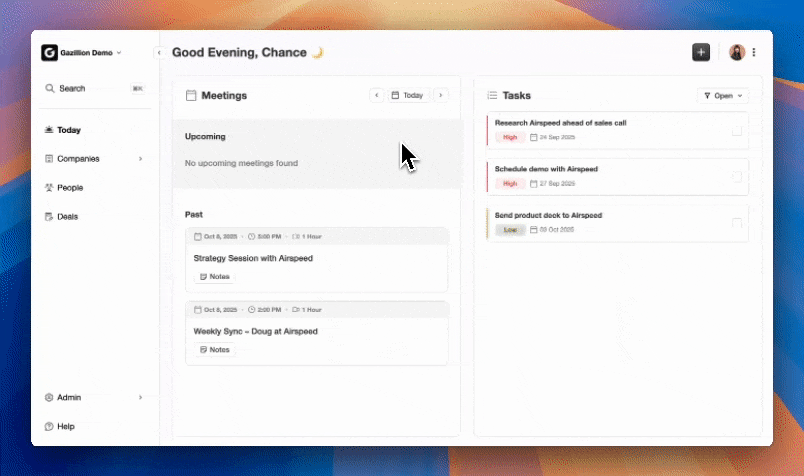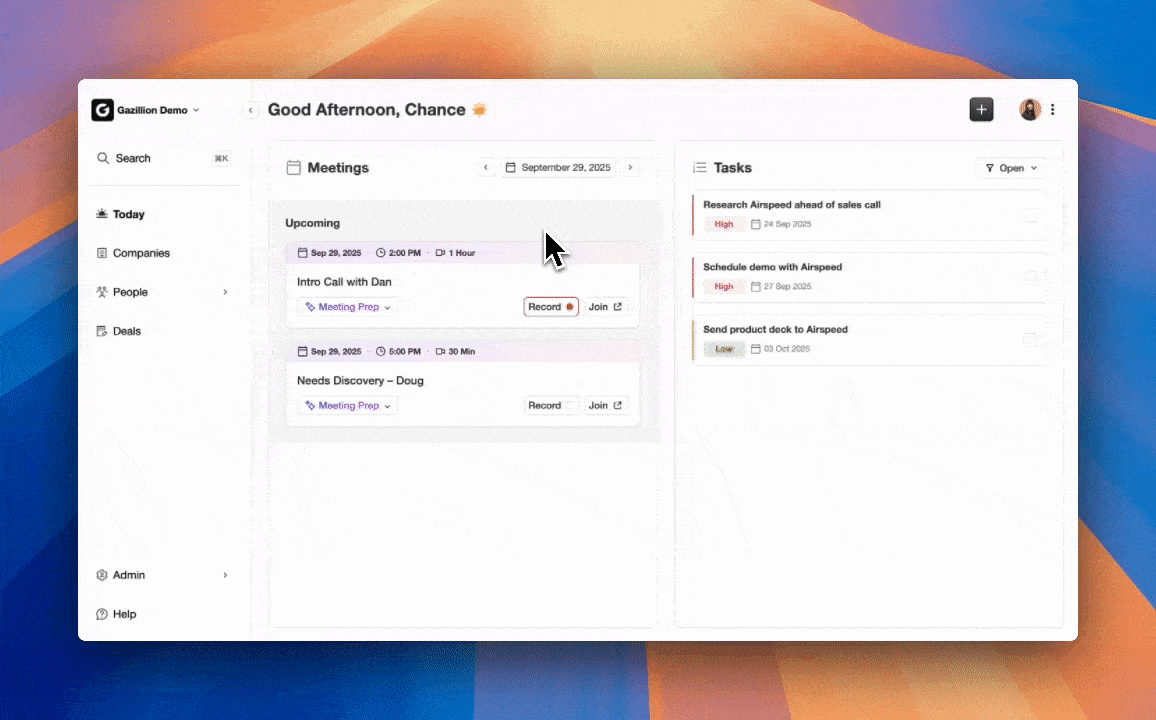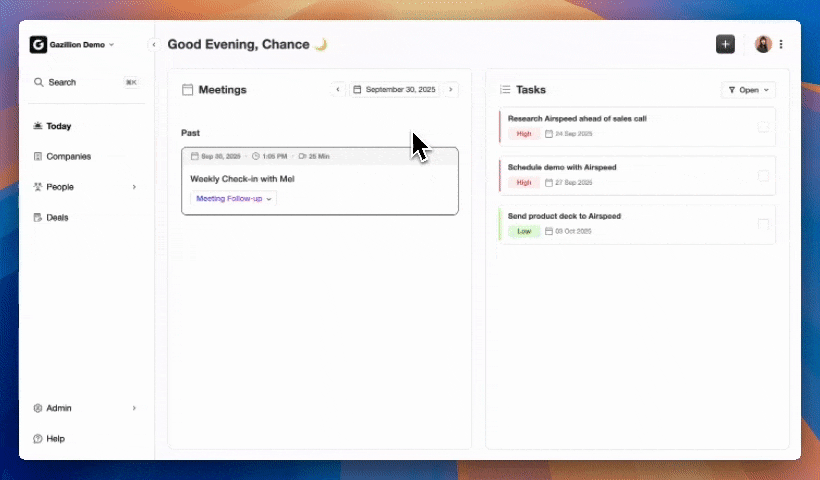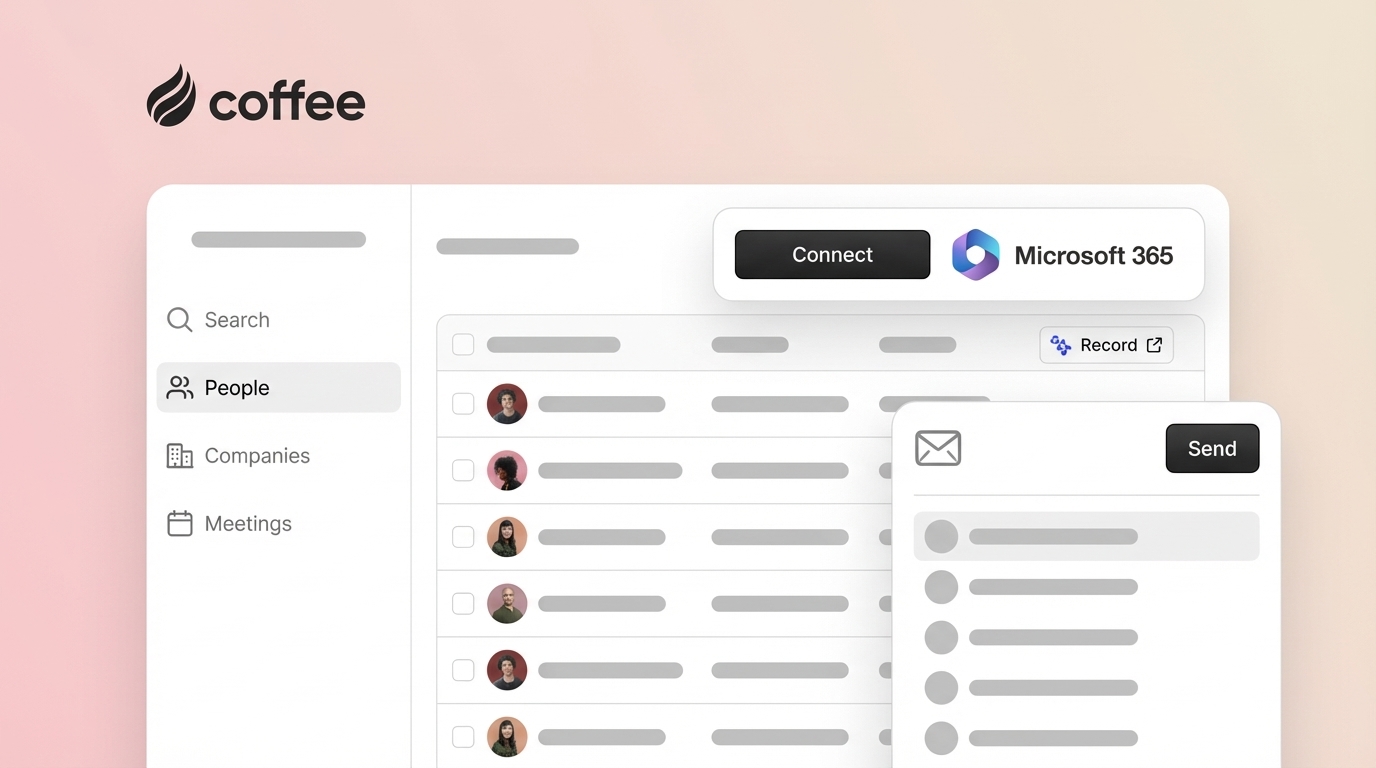Key Takeaways
- Legacy CRM systems often act as passive databases, which limits sales productivity and creates ongoing data quality issues.
- AI agents connected to email, calendars, and meetings improve CRM data accuracy while reducing manual data entry and admin work.
- Successful AI-powered CRM projects align technology with user adoption, data quality, and clear ROI metrics like time savings and pipeline velocity.
- Consolidating point tools into an agent-led CRM stack reduces complexity, improves security, and simplifies maintenance for revenue teams.
- Coffee provides an AI-powered CRM agent and platform that automates data capture and sales workflows; get started with Coffee to evaluate it for your team.
The Critical Juncture: Why Legacy CRM Sales Automation Falls Short
Understand Why Legacy CRMs No Longer Keep Up
The CRM market in 2026 centers on automation and intelligent assistance instead of static record-keeping. Many legacy platforms like Salesforce and HubSpot still function mainly as databases that rely on humans to create, update, and interpret records, which caps productivity and adoption.
Reduce Fragmented Data and Manual Workflows
Most sales teams operate across multiple tools for outreach, enrichment, call recording, and forecasting. Without an agent that unifies information, representatives switch between systems to log notes, update records, and hunt for context. This fragmented workflow increases costs and slows response times.
Address the Manual Data Entry Drain
Legacy automation assumes that busy sales professionals will keep data complete and accurate. Coffee’s market data indicates that 71% of sales representatives spend significant time on data entry, which leaves only 35% of their time for direct selling activities. CRMs that depend on manual updates often become incomplete systems that leaders cannot trust for forecasting.
Modernize Architecture for Unstructured Data
Older CRM architectures were not built for large volumes of unstructured data such as email threads, call transcripts, and meeting notes. Some platforms struggle to capture and process this information in a structured way, which limits their ability to power accurate recommendations or agent-driven workflows.
Improve User Experience and Adoption
Sales teams often view legacy CRMs as compliance tools instead of daily assistants. Low adoption leads to poor data, which then produces weak insights and further discourages use. This cycle pushes teams toward spreadsheets or shadow tools that create even more fragmentation.
Get started with an AI-powered CRM sales automation solution that addresses these legacy limitations.
The Agent Inflection Point: How Coffee Automates CRM Sales Work
Coffee’s Philosophy: Let the Agent Do the Work
Modern AI enables a shift from passive software to active agents. Coffee is built on a simple idea: the system should handle repetitive sales tasks and data capture so that humans can focus on conversations and strategy.
Coffee follows a “Good Data In, Good Data Out” approach. The Coffee Agent connects to email, calendars, and conversation transcripts, then automatically ingests and structures this information. This method reduces reliance on manual input and creates a reliable data foundation for forecasting, reporting, and coaching.

Core Value Propositions of Coffee’s Agent-Led CRM
Coffee focuses on a few specific outcomes for sales teams:
- Automated data capture: The agent creates and enriches contacts, companies, and activities from ongoing communication. Many teams see 8–12 hours per week returned to each representative.
- Unified context: Structured and unstructured data flows into a single, coherent view of accounts, opportunities, and stakeholders.
- Meeting preparation and follow-up: The agent prepares briefings, generates summaries, identifies action items, and drafts follow-up emails based on meeting content.
- Reliable pipeline intelligence: With accurate, up-to-date records, leaders gain cleaner forecasts, better coverage views, and less reliance on manual exports or add-ons.
- Tool consolidation: Coffee combines CRM, enrichment, recording, and forecasting functions to reduce license spend and integration maintenance.

Coffee supports two deployment models. Organizations can adopt the Standalone AI-first CRM as a primary system of record, or use the Companion App to run the Coffee Agent on top of Salesforce or HubSpot while preserving existing investments.
Strategic Considerations for Implementing AI-Powered CRM Sales Automation
Evaluate Organizational Readiness
Effective AI-powered CRM projects start with a clear view of current systems and culture. Leaders should assess data quality, integration requirements, security standards, and team openness to new workflows. Teams with low-quality or incomplete data often benefit from an agent that cleans and enriches records as part of daily work.
Decide Whether to Build, Buy, or Augment
The choice between custom development, a new platform, or an augmentation layer depends on internal engineering capacity and timeline. Many small and mid-market organizations see faster results by augmenting existing Salesforce or HubSpot instances with Coffee, which improves data quality and usability without a full migration on day one.
Set Clear ROI Expectations and Metrics
Measuring ROI from AI-powered CRM automation works best with a focused set of metrics. Common indicators include weekly hours saved per representative, data completeness, forecast accuracy, pipeline velocity, and cost per opportunity. Establishing baselines before rollout makes it easier to quantify impact during and after deployment.
Plan for Change Management and Adoption
User adoption determines whether AI-powered CRM automation delivers value. Coffee is designed to remove work from sales representatives instead of creating new forms or workflows. When the system captures notes, meetings, and tasks automatically, adoption becomes a byproduct of utility rather than a top-down mandate.
Get started with a CRM sales automation platform designed for rapid adoption and measurable productivity gains.
Avoiding Strategic Pitfalls in Your CRM Sales Automation Journey
Prioritize Data Quality from the Start
Feature-rich systems with poor data rarely produce useful insights. Successful teams design their CRM architecture so that data flows automatically from core communication channels, then use the agent to enrich and normalize records in the background.
Reduce Friction to Improve Training and Adoption
Complex configuration and long onboarding cycles often stall CRM projects. Tools that demand extensive manual updates can feel like extra work. Systems that remove repetitive tasks and surface next steps inside existing workflows earn faster adoption.
Control Tool Sprawl
Adding separate tools for recording, enrichment, forecasting, and engagement can create overlapping features and integration risk. An agent-led platform that consolidates these capabilities simplifies vendor management, improves data consistency, and lowers maintenance overhead.
Limit Over-Customization of Legacy Systems
Heavy customization of older CRMs can increase costs and create brittle configurations that are hard to maintain. Attaching an AI agent like Coffee as a companion layer often delivers more value than extensive one-off custom development.
Meet Security and Compliance Requirements
CRM automation platforms handle sensitive customer information, so security controls and compliance standards matter. Coffee supports SOC 2 Type 2 and GDPR requirements and provides clear data handling practices so that revenue teams and security teams can align.
|
Capability |
Coffee’s Agent |
Traditional CRM |
Integration Tools |
|
Data Entry |
Fully Automated |
Manual Input Required |
Partial Automation |
|
User Experience |
Eliminates Admin Work |
Creates Admin Burden |
Adds Complexity |
|
Implementation |
Simple Authentication |
Complex Customization |
Technical Expertise Required |
|
Maintenance |
Self-Managing |
Ongoing Manual Updates |
Dedicated Team Needed |

Conclusion: Move Toward Agent-Led CRM Automation
Sales teams that rely on manual data entry and fragmented tools face growing execution risk in 2026. AI-powered, agent-led CRM automation offers a practical path to reduce administrative overhead, improve forecast accuracy, and give sellers more time with customers.
Coffee demonstrates how an AI agent can handle data capture, orchestrate workflows, and surface pipeline insights in one system. Leaders who evaluate their current CRM stack, quantify manual effort, and plan an agent-led roadmap are better positioned to compete.
Get started with Coffee’s AI-powered CRM sales automation and evaluate how an agent-led approach can support your revenue goals in 2026.
Frequently Asked Questions (FAQ)
How does an AI agent improve CRM user adoption compared to traditional CRM automation features?
An AI agent improves adoption by handling the work that users usually avoid. Coffee captures information from email and calendars, enriches records, and generates meeting summaries without manual input. The CRM becomes a useful assistant that supports daily sales activity, which encourages consistent use.
Can Coffee integrate with an existing Salesforce or HubSpot instance without creating more data fragmentation?
Coffee’s Companion App operates as a data orchestration layer on top of Salesforce or HubSpot. The agent captures and structures data from multiple sources, then writes clean, enriched records back into the CRM. This approach reduces duplicate records and improves the link between activities, contacts, and opportunities.
What kind of ROI can organizations expect from implementing an AI-powered CRM sales automation agent like Coffee?
Most organizations see ROI through time savings, higher-quality data, and lower tool costs. Representatives often reclaim 8–12 hours per week that would otherwise go to manual logging and follow-up creation. Cleaner data improves forecasting and pipeline reviews, while consolidating point solutions can reduce software and integration spend.
How does Coffee handle data security and compliance while processing sensitive customer information?
Coffee maintains SOC 2 Type 2 and GDPR compliance and separates customer data from public AI training. The platform is designed so that sensitive information remains protected while still enabling automation, search, and analytics across email, meetings, and CRM records.
What happens to existing CRM customizations and workflows when implementing Coffee’s agent?
Coffee’s Companion App respects current field mappings and workflows in Salesforce or HubSpot. The agent populates those fields with higher-quality data, which makes custom processes more reliable. Organizations that choose the Standalone CRM can use migration tools and implementation support to move from legacy systems with minimal disruption.
Get started with Coffee’s AI-powered CRM sales automation to improve data quality and sales productivity.
